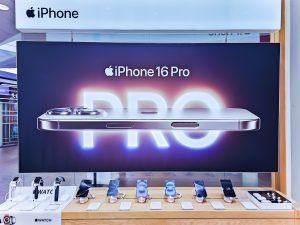Indonesia and Apple are currently in a bit of a kerfuffle involving market access and investment. Essentially, Indonesian authorities are not allowing Apple to sell its latest product, the iPhone 16, in the country. The government has been fairly explicit about why they are doing this: they want Apple to invest more in local production in exchange for market access.
Apple does not currently have any production facilities in Indonesia despite the fact that, according to the government, 2.3 million iPhones were sold by local retailers in 2023. Indonesia wants more high-tech industrial manufacturing to drive growth so the government decided that, given the size of the domestic market, they were going to play hardball in order to get more production from Apple.
And, to some extent, it worked. Apple originally agreed to invest $100 million, but later raised the offer to $1 billion to build a manufacturing facility in Batam. By early January, however, the iPhone 16 was still being blocked at Indonesian retailers. It appears that some within the government, having gained initial concessions from Apple, are pushing for more such as investment in research and development. Of course, many might argue this kind of policy whiplash and lack of clarity is the very thing that kept Apple from investing in Indonesia in the first place.
One thing that we know for sure is that Indonesia leveraging market access to try and secure better investment terms should surprise absolutely no one. They have used this same trick repeatedly in recent years, banning TikTok, blocking Netflix, and refusing to export nickel ore until they got investment on terms considered more beneficial to the national interest. And each time they got more or less what they wanted. TikTok took over Tokopedia, without which GoTo could probably never be profitable. Netflix started investing in and carrying a lot of local content. And the downstream industrialization of nickel is moving ahead at full speed.
It is increasingly obvious that this is not a passing fad. It is a reflection of a changing international political economy, one where middle powers with rapidly growing economies like Indonesia feel they have more bargaining power than they once did. Ten years ago, I think it’s unlikely Indonesia would have been as aggressive with Apple. The domestic market for iPhones was smaller, and such a ban would have resulted in pressure from free trade enforcers, like the World Trade Organization.
Things are different now. First, no one is worried about being sanctioned for protectionist trade policies any more. Second, Indonesia has more purchasing power and a bigger economy than it did a decade ago, although it should be noted that the Indonesian market for luxury smartphones is not so big that Apple will agree to anything in order to get access, and it would be a mistake for economic nationalists within the government to overplay their hand here. And third, there is a general sense that if Apple won’t meet their terms, other countries will.
Take Chinese smartphone maker Oppo, for instance. They have been operating a factory in West Java since 2022 and recently said they plan to scale up local production. Another Chinese smartphone maker, Honor, said it would start building production facilities in Indonesia. They announced this right when things were getting tense between the Indonesian government and Apple, so it was clearly meant to send a message. Are Oppo and Honor interchangeable with Apple? No. But the best product or most dominant brand is not what the Indonesian state really cares about. They want the manufacturing. And they will be receptive to whoever is willing to deliver it.
I have been writing a lot recently about the rise of economic nationalism, and how states in Southeast Asia and beyond are becoming more assertive about intervening in markets to get favorable investment terms or to accelerate certain kinds of industrialization. Indonesia has been one of the regional trend-setters here, but we see it across the region. And while I am sure that the issues with Apple will be worked out and iPhone 16s will soon be available in Indonesia, I am equally sure that the Indonesian government will continue to use this tactic with other firms and other industries in pursuit of the state’s developmental mandate.
































